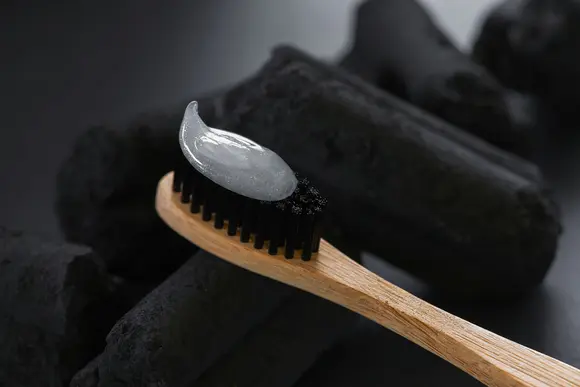Are you currently brushing your teeth with charcoal toothpaste? Well, charcoal toothpaste is now a popular concept for active dental care. But there are some risks involved in its usage due to its abrasive properties being higher than usual toothpastes and oral cleaning agents. Read on to find out more about this specific tooth-cleaning product. Consult with an experienced dentist of a prominent dental clinic in Kolkata to use charcoal toothpaste only under their recommendation.

Curious to find out what is charcoal toothpaste before brushing with it? Well, charcoal toothpaste is a kind of toothpaste containing activated charcoal which is a type of treated carbon with porous surface particles. So, the created nooks and edges act like strong magnets and dissolve particles stuck on your teeth which get cleaned the moment the charcoal is rinsed away. If you use this toothpaste, the activated charcoal included in it will bind to stains, bacteria and tartar for removing them to whiten your teeth and freshen up your breath.
1) Increases the whiteness of teeth by eliminating extrinsic stains – Superficial stains often develop on your teeth’s outer enamel due to a few specific substances found in wine, caffeine, stain-producing food items and cigarettes. These stains badly affect the aesthetics of your teeth. Activated charcoal helps in adsorbing these extrinsic stains to make your teeth much whiter than before. However, usage of charcoal toothpaste should not be compared to bleaching or teeth whitening as those processes aid in the removal of internal stains too which this product cannot do.
2) Removes plaque accumulation and enhances the freshness of your breath – Troubled with bad breath? Well, research reveals that activated charcoal is functional in pushing up the pH level of oral cavity mainly due to its binding potential to acidic substances. This toothpaste accelerates the elimination of acidic components and compounds from your mouth. Thus, activated charcoal plays a major role in removing plaque to offer you relief from unpleasant mouth odor.
1) Too harsh for daily use – The abrasive nature of charcoal which speeds up the removal of surface stains also makes this toothpaste unsuitable to apply on your brush on a regular basis. Using this toothpaste can wear down your teeth’s enamel coating, exposing dentin below it to make your teeth appear yellower and become more sensitive over time.
2) There are safety issues – Patients were officially made aware of using charcoal toothpaste in 2017 as its prolonged effects were yet to be determined. Thus, it’s unclear if this product is safe for using regularly.
3) Fluoride is absent – Dentists usually recommend the application of fluoride-containing toothpastes as they strengthen the enamel and keep it protected. As enamel is the outer portion of the tooth which safeguards against decays and cavities, its protection is integral for your dental care routine. The worst thing about charcoal toothpaste is that it’s found to increase decaying of teeth.
4) Can actually form stains – Daily use of charcoal toothpaste may in fact cause stains on your teeth due to buildups of charcoal particles in the cracks and crevices of older teeth, making their color darker. So, frequent use of this toothpaste might produce new stains while removing older ones, making its use unfavorable for many.
5) May jeopardize the results of dental restorations – Did you get crowns, fillings, bridges or veneers fixed on your teeth recently? Then, it’s unwise to brush your teeth using charcoal toothpaste regularly as it may produce stains on such dental restorations, forming unattractive black or grey outlines around them. This will ruin your teeth’s appearance and impact your smile adversely!
If you want to give charcoal toothpaste a try, do go for it but be careful to use it safely. First of all, do not make it an alternative to your usual fluoride toothpaste. You should use it only at times in one or two weeks as a supplement to your daily oral care regimen. Be sure to brush lightly when using charcoal toothpaste for mitigating its abrasive effects. Then, proceed by rinsing your mouth thoroughly. Be cautious about using it if you’ve got dental restorations placed as there’s always a great risk of the charcoal accumulating around it and creating unappealing stains.
Make an appointment with an expert dental doctor who’ll be able to offer you proper guidance on charcoal toothpaste usage, underlining the precise charcoal toothpaste benefits and charcoal toothpaste risks to you.